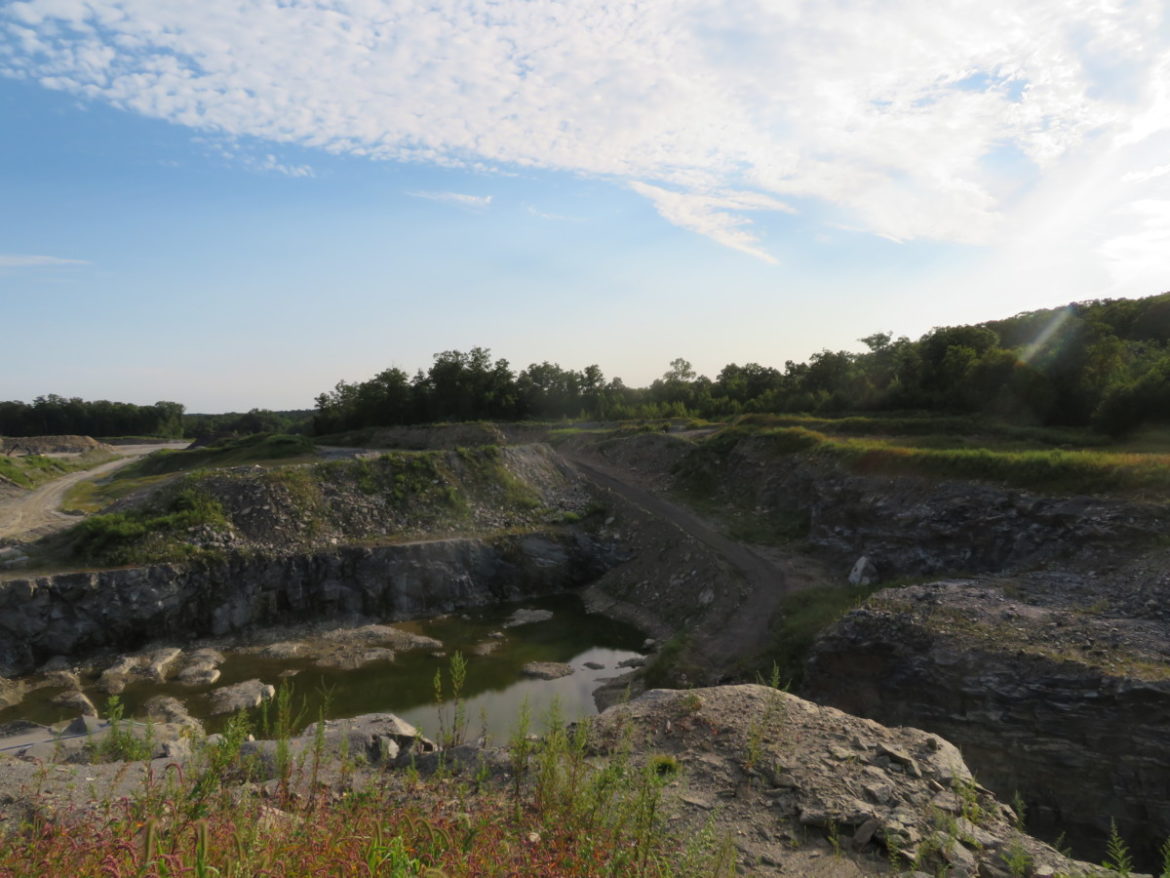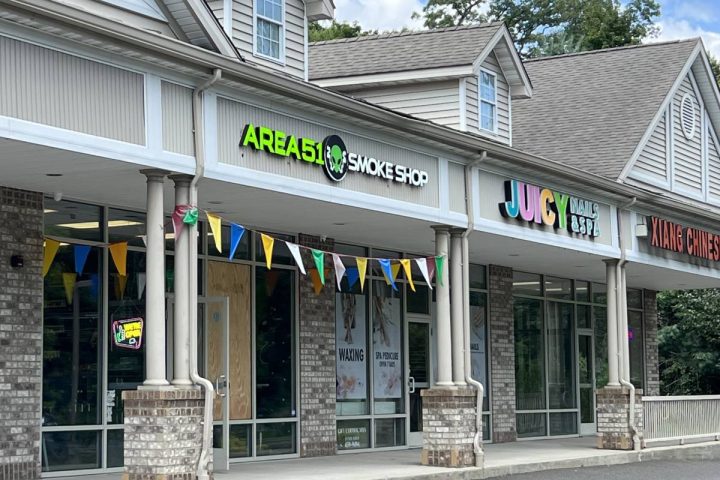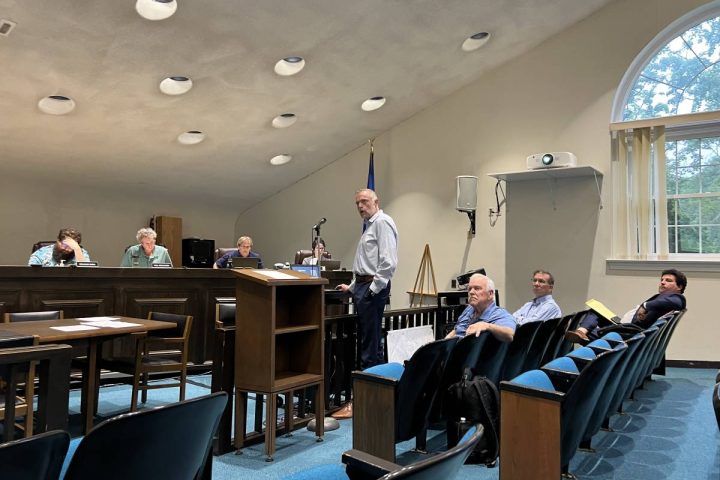MONROE, CT — A debate over whether to hire an expert for a site plan application in the Pepper Street Business Park late last month ended with Planning and Zoning Commission members deciding to invite a consultant working for the Inland Wetlands Commission to their next meeting.
But on Monday, Town Planner Rick Schultz said Russell Dirienzo, a licensed environmental professional, who is principal geologist and associate vice president of Arcadis, a Sandy Hook firm, will not attend this Thursday’s meeting.
The discussion at the Dec. 17 Planning and Zoning Commission hearing had ended with commissioners agreeing to invite Dirienzo to a meeting to answer questions about his report to Inland Wetlands, rather than hiring their own expert, because the deadline for making a decision is almost here.
Owners of property at 64 Cambridge and 4 Independence drives want to bring in 980,000 cubic yards of material over a period of 10 years to fill in a large hole left by an illegal rock crushing operation, restore damaged wetlands and build a small office building.
Kevin Solli, of Solli Engineering, the engineer for the applicants, Astro Land Holdings LLC and Spacely Land Holdings LLC, told the commission borings were made and soil and water tested on the site showed no contamination.
But Leon Ambrosey, a commissioner, noted that significant areas on the 72-plus-acre-site had been excavated and filled by the previous owner. He suggested that the commission hire its own consultant to determine exactly what was in those fill materials.
Chris Pawlowski, a project engineer at Solli Engineering, said the firm is against the hiring of additional experts at this time.
Attorney Steve Finn, who represents the applicants before the Inland Wetlands Commission, said commissioners already have information from his client’s experts, the intervenor’s experts and from Dirienzo, who was hired by the town.
Finn said Dirienzo rendered an independent opinion that he has no concerns over contaminants at the site or to the groundwater.
Joel Z. Green, the attorney for the intervenor, neighboring property owner Peter Metropoulos, mentioned Dirienzo also gave his expert opinion that the plan to rehydrate the wetlands has only a 30 percent chance of success. But Finn said that is an inland wetlands issue, not a planning and zoning issue.
Polling the commission
Ambrosey asked Chairman Michael O’Reilly to poll fellow commissioners to see if there was consensus to hire an expert.
“I do not think we need another professional,” O’Reilly said. “Like I said before, we have enough professional opinions. What we need now are prudent, nonprofessional residents of the town of Monroe to look at the findings that are written in clear English. These white papers are not written in legalese. They’re not written in technical language. They’re written in English.”
O’Reilly asked how many “clearly written” expert opinions commissioners really need?
“I don’t know and I don’t think you know what is the appropriate material to put in a GAA site,” Ambrosey said of the site’s proximity to the public water supply. “I think we need to know those answers before we allow certain fill to be brought on this property. That is my opinion.”
O’Reilly said the Connecticut Department of Energy and Environmental Protection has regulations for that. “I’m going to vote no,” he said of hiring a consultant.
Vice Chairman Bruno Maini voted yes and Secretary Ryan Condon voted no.
Robert Westlund said he leaned toward no, but suggested having a special meeting to discuss it more. Nicole Lupo, a commission alternate, agreed with Westlund that the commission would benefit from a special meeting. “But if had to, I’d say yes,” she said.
“We’ll have another professional opinion giving us the same facts, so I’m gonna vote no,” said Domenic J. Paniccia, a commission alternate.
Ronald Schneider, an alternate, said he leaned toward yes, to be 100 percent sure the commission does not allow fill that could ruin the property.
“It sounds like there’s some inclination to hire an expert,” O’Reilly said. “I think we should have a special meeting to see what we would be looking for.”
But Solli said he thought the timing would be problematic so late in the process with Christmas and New Year’s coming up, because the commission would have to put it out to bid, wait for responses, then for the work to be done and a report to be submitted, which his client and the intervenor would need time to respond to.
O’Reilly said, “I think you commissioners need to realize you bear some responsibility here in making decisions — and you’re not going to hire someone else who’s going to come in and tell you how to vote.”
But Ambrosey noted how Solli said no asphalt was being used as fill material only for Evan Glass, a hydrogeologist hired by the intervenor, to point out asphalt was found in one of the borings.
“We have no idea what’s in those holes,” Ambrosey said.
“Let me clarify my statement,” Solli said earlier. “There’s been no wholesale use of asphalt as fill. There may have been an errant asphalt particle somewhere, which may have been picked up by a boring.”
Jane Warren, an environmental attorney, for the applicant, said some asphalt fragments were found in the soil, but it is part of the DEEP definition of clean fill. “You’re going to find them in every scoop of fill,” she said.
Warren said the town’s consultant determined the testing was sufficient, the samples complied with environmental standards and no further sampling was warranted.
O’Reilly asked William Agresta, the town’s planning and zoning administrator, what happens if the time runs out on the application.
Agresta said they will have to close the hearing and render a decision. If the commission wants to hire someone to do testing, he said Town Council approval would be needed, adding meeting the deadline would be “quite a challenge.” It would also be difficult to test soil with snow on the ground, he said.
Agresta said the hearing must be closed and a decision must be made near the end of January.
Green suggested the commission hire a professional, at the applicant’s expense, to do a peer review rather than testing, adding it would not be as time consuming or expensive.
Finn said Dirienzo’s report to the Inland Wetlands Commission concluded there would be no impact to the watershed. He said a water company came to the site and had no concerns.
Maini asked Finn, if he would drink the water if he lived next to the site and Finn said he would.
Westlund said he appreciates Ambrosey’s concern for what’s on the site, but at this point he said he thinks the commission should review the information it has and make a decision.
The commission seemed deadlocked over hiring an expert.
Since the testing Maini wants cannot happen, he said he would at least favor hiring someone for a peer review. Lupo agreed. Schneider leaned toward no, because of the timing, but Ambrosey supported having a peer review to ensure the commission is doing the right thing.
Agresta suggested inviting Dirienzo to the next Planning and Zoning meeting, which is this Thursday. Barbara Schellenberg, the commission’s land use attorney, said she would have to look into the protocols, because Dirienzo was hired to consult another town commission, not Planning and Zoning.
O’Reilly asked Ambrosey if he would be satisfied if they could get Dirienzo to attend the meeting, so he could ask him questions and Ambrosey said he would be.
But that will not happen Thursday.
An ongoing battle
Solli said he used historic survey information to calculate estimates that 2,460,000 cubic yards had been excavated at the property, approximately 372,900 cubic yards were stockpiled or placed on the site, and approximately 84,900 cubic yards had been imported to the property.
Any metals taken from processed materials during the filling operation would be sold, but Agresta said he wanted to ensure the site does not become a processing facility over the next 10 years, which is not a permitted use in the I-2 District.
Green asked several questions about documentation showing the quantity and quality of the material brought to the site since 2006. Arnold Karp, managing partner of the two LLCs that own the properties, was bothered by the focus being on the history of the property, rather than the plan to move forward.
“Yes there are tickets,” Karp said of records from every truck delivery. “Do you want us to print out 20 reams of paper to show the tickets? Explain to me what that would prove to you. That would help, before we kill a forest of trees to prove that we have tickets.”
Green said he is trying to figure out what materials were used to fill holes on the site and where it came from. He asked if Karp could make the documentation available to the town or the intervenor if they ask.
“If you will provide assistance to photocopy 30 reams of paper, we will get you what you need, but I’m not sure what this has to do with this application,” Karp replied.
Karp and Solli have accused the intervenor of trying to slow down the process.
“This application has been contentious from day one, because there’s an abutting property owner, who resides in California, who has filed complaints with everyone and anyone,” Solli said during the hearing, adding Metropoulos has been incessant in writing emails to officials.
Solli said his client has filed several applications at once, rather than separately, because Metropoulos would file for intervenor status on every application and waste the commission’s time.
Green said he wanted to respond to the “exasperation” Solli expressed at Metropoulos intervening on the application.
“Everyone seems to be ignoring the history of this site, the condition of this site, the reckless and intentional conduct that went on on this site,” Green said, “and my client, as an owner of over 100 acres of property that directly abuts this property, is not here for sport or entertainment. He’s here because he has a serious concern and a justifiable concern as to what’s happening on a neighboring property, and I just hope the commission bears that in mind. And my questioning is also not casual or for sport. It goes directly to the basis for our intervention.”
Solli reminded the commission that his client is trying to address a previous wetlands violation from the former property owner to make the industrial properties viable for development again.







I’m truly amazed how Mr. Solli can keep a straight face when discussing the former Quarry Owner’s misdeeds, as he represented the previous owner over the last 10 years.